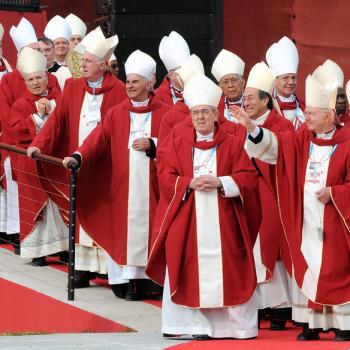Al Mohler has an interesting piece trying to define what is meant by “evangelical.” He goes back into history, though strangely he says nothing about the source of the word in Lutheranism. “Evangelical” used to be the name for “Lutheran,” in distinction to both Roman Catholics and Calvinists, a.k.a., “Reformed.” The term comes from evangelium, the Latin version of the Greek word for “good news”; that is, the Gospel. And the Christian Gospel is that salvation is a free gift, won by Jesus Christ, the Incarnate Son of God, who atoned for the sins of the world when He died on the Cross and who rose from the dead for our justification. “Evangelical” was used to describe Lutheranism because the Gospel is the “chief article” of its theology–not God’s sovereignty, not morality, not church government, but the Gospel–the linchpin of every other teaching, including Baptism and the Lord’s Supper.
But I acknowledge that many other kinds of Christians–not just Lutherans–also believe in the Gospel and make it central, and they too can go by the name “evangelical.”
Dr. Mohler, whom I think highly of, says that the term refers to conservative Protestants to distinguish them from liberal Protestants, as well as from Catholics. He then gives some description of evangelicals as a social group. But I think that the term, to be meaningful, must retain its core meaning of holding to the centrality of the Gospel. And some conservative Protestants do NOT make the Gospel central, not really, and so shouldn’t use the name “evangelical.”
If you believe that you are saved by your good works, you are NOT an evangelical.
If you believe that salvation comes from how good you are, you are NOT an evangelical.
If you no longer believe in justification by grace through faith in Christ (as many “evangelical” theologians don’t anymore), you are NOT an evangelical.
If you do not believe in the Atonement (as many “evangelical” theologians don’t anymore), you are NOT an evangelical.
If you believe that Christianity is all about creating a perfect society on earth, you are NOT an evangelical.
If you believe that Christianity is all about giving you prosperity, that the good news is about your earthly success, rather than the Cross of Jesus Christ, you are NOT an evangelical.
If you believe in faith, but put your faith in yourself, rather than in Christ (as I have heard “evangelicals” preach on TV), you are NOT an evangelical.
I’m not saying those I’m referring to may not be Christians–if they have even a trace of faith in the work of Christ, buried under all kinds of other teachings, they may be–but they should come up with other words for themselves.
What Makes Evangelicalism Evangelical?, Christian News.















